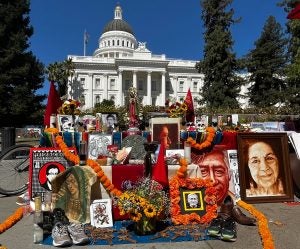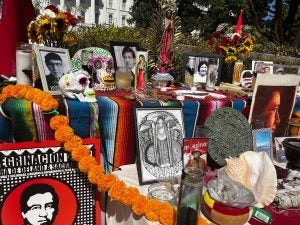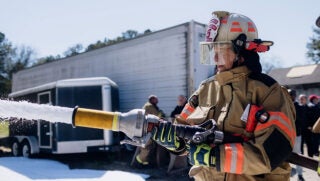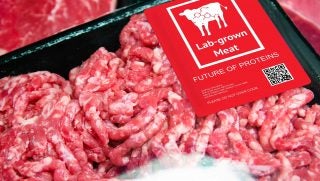California farm workers prove that some things are worth fighting for through their advocacy to have Gov. Gavin Newsome sign Assembly Bill 2183, which would give farm workers flexibility in their right to vote for a union.
In August, the United Farm Workers Association led a 24-day march from Delano, California across the Central Valley to the state capitol of Sacramento to collectively urge Newsome to sign the measure. Throughout their march, farmworkers and their allies from across the state joined in when the marchers pass through their towns. The protestors started their march each day at 7 a.m. and usually didn’t reach their next checkpoint until about 4 p.m. This is nearly 335 miles in the California summer heat.
“We’re walking because we want to make sure that the governor signs the bill that would make it easier for farmworkers to vote for union representation,” said UFW President Teresa Romero. “They deserve that, they are essential workers, they put food on our tables day in and day out and we need to treat them with the respect that they deserve.”
AB 2183 expands voting options for farmworkers by allowing them to choose if they want to vote at a physical location, or vote by mailing or dropping off a representation ballot card to the Agricultural Labor Relations Board (ALRB) office. Farmworkers will be able to receive assistance in filling out and returning their representation ballot card as long as the person assisting them co-signs it, and it is returned to the ALRB office in a sealed and signed envelope.
In voting for a union, farmworkers often face challenges, such as intimidation by their employers and language barriers that can lead to them being misinformed on what they’re voting on.
“With your march and the sacrifices that you’re doing, we hope that this will reach the consciences and the hearts of the growers — and also the heart of the governor,” said Dolores Huerta in a video by the UFW, moments before the march took the first steps of their 24-day journey.
On August 21, 2022, the march passed through Stockton, California where Butte County District 2 supervisor Debra Lucero came to show support.
“I am here for two reasons,” Lucero said. “It’s historic and I’m here for Carmen Ramirez who was a supervisor in Ventura County. She tragically passed away last week and she was going to be here today so we’re marching in honor of her. I’m also marching in honor of my father who wanted to do this march many years ago and didn’t have the opportunity, so I’m here for him too. We’re here in unity and in solidarity with the farmworkers, in hopes that Gov. Newsome will realize that it’s time.”
The UFW concluded its March to the State Capitol on August 26. To their dismay, Newsome announced he could not sign the bill. But that’s not enough for the marchers to give up.
In a video posted by the UFW, farm worker Teresa had a message to share.
“I come from the city of Lamont, California. I have marched for 24 days for 335 miles,” she said. “I am asking the governor to sign the bill. I am not asking for it, I am demanding it. I come from Lamont, where vegetables and fruits are harvested according to season. In my job, I’ve always picked tangerines and oranges. Now, I work in carrot cleaning which is called ‘el pellizco.’ We work all day long with high temperatures. During the height of COVID, we did not rest, and according to you we are essential workers, but only in words.”
In response to Newsome’s decision, UFW members and volunteers set up a 24-hour vigil for farm workers outside the state capitol and other locations in California such as San Francisco, Fresno and Los Angeles. At these vigils are altars decorated with Day of the Dead decorations like traditional orange marigolds and pictures of farm workers that have passed away. Each vigil has remained standing to the current day since they have been set up.
This week, just two days before the bill’s deadline, Newsome finally signed AB 2183.
“California’s farmworkers are the lifeblood of our state, and they have the fundamental right to unionize and advocate for themselves in the workplace,” the governor said in a news release.

Some days at the vigils had been busier than others. Some days they got visited by lots of people showing their support, including politicians and state officials, and sometimes people came and played Spanish music or dance. Other days, the vigils remained tranquil with UFW volunteers overseeing them.
UFW volunteer Antonio De Loera has helped oversee the vigil and wants farm workers to be able to organize a union free from intimidation or retaliation, he said.
“California talks a lot about its progressive values — well this is a chance to prove it,” De Loera said.
Being from Yolo County, De Loera has personal experience with farm worker hardships, he said.
“Farm workers put themselves on the line to put food on our table and often find that their own conditions are not what they should be,” De Loera said. “Yolo County studies found that almost half of farm workers are food insecure, so how can it be that the very workers who are putting food on our table often struggle to feed their own families?”

The UFW has received support from people all over the nation, including local, federal, and even national politicians, including President Joe Biden who released a statement showing his support of AB 2183 and the value of work unions.
“Government should work to remove — not erect — barriers to workers organizing. But ultimately workers must make the choice whether to organize a union,” he said.
Saul Reyes serves as the 2022 American Farmland Trust Agriculture Communications Intern at AGDAILY, with a focus on helping to amplify diversity and minority voices in agriculture. An FFA alum, Reyes is a student at California State University-Chico and is double majoring in plant and soil science and multicultural and gender studies, while minoring in intersectional Chicanx/Latinx studies and public relations. He can be found on Twitter @sreyes710.





